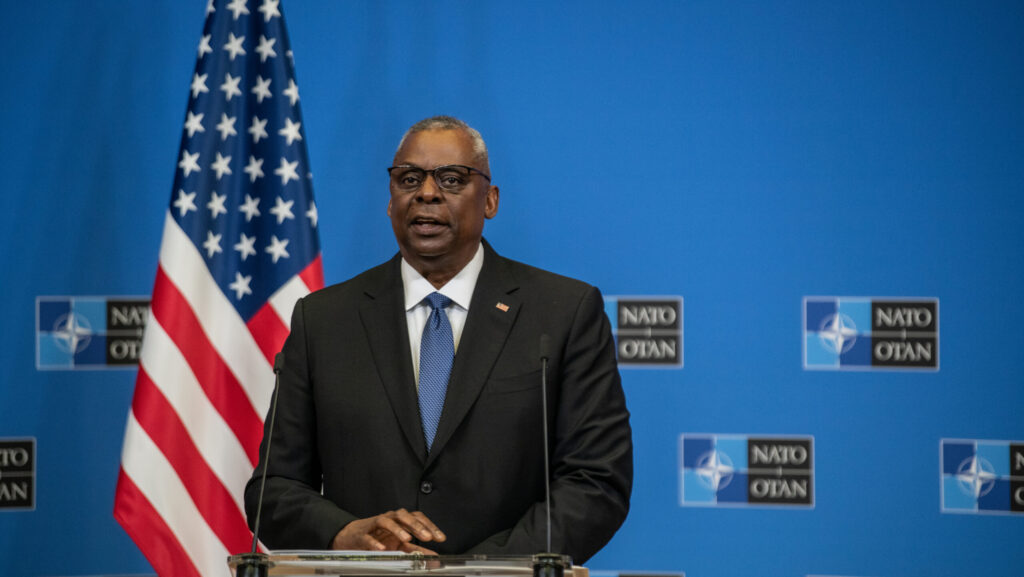Secretary of Defense Lloyd Austin conducted a press briefing at NATO headquarters, Brussels, Belgium on June 16, 2023. (US Air Force Tech. Sgt. Jack Sanders)
WASHINGTON — At a time when Ukraine’s military is undergoing a leadership shakeup, a medical emergency is sidelining US Defense Secretary Llyod Austin’s plans to head to Europe this week to meet with other defense leaders on possible weapon supplies for Kyiv.
“Secretary Austin will no longer travel to Brussels this week as originally scheduled. However, Wednesday’s Ukraine defensive contact group will continue it albeit virtually,” Pentagon spokesman Maj. Gen. Pat Ryder told reporters today. “While Secretary Austin currently intends to participate in the virtual [Ukraine Defense Contact Group] UDCG, he will remain flexible depending on his health care status.”
Chairman of the Joint Chiefs of Staff Air Force Gen. CQ Brown will also plan to attend the monthly Ukraine Defense Contact Group virtually, Ryder said. However, Celeste Wallander, the assistant secretary of defense for international security affairs, will be there in person to “represent the secretary as required,” Ryder added. As for Thursday’s NATO defense ministerial meeting in Brussels, the plan now is to have US Permanent Representative to NATO Ambassador Julianne Smith there to fill in.
In the aftermath of a prostate cancer diagnosis and surgery, Austin was hospitalized at the start of the new year due to an infection. Then on Sunday, an “emergent bladder issue” prompted him to return to Walter Reed National Military Medical Center, where he remains. It is unclear when he may leave but he is expected to make a full recovery, according to the Pentagon.
Austin “underwent non-surgical procedures under general anesthesia to address his bladder issue. We anticipate a successful recovery and will closely monitor him overnight,” two doctors at Walter Reed said in a statement from the Pentagon. “A prolonged hospital stay is not anticipated. We anticipate the Secretary will be able to resume his normal duties tomorrow. The current bladder issue is not expected to change his anticipated full recovery. His cancer prognosis remains excellent.”
A prolonged hospital stay is not anticipated. We anticipate the Secretary will be able to resume his normal duties tomorrow. The current bladder issue is not expected to change his anticipated full recovery. His cancer prognosis remains excellent.
Austin’s schedule change comes at a precarious time for the now two-year-old conflict in Ukraine. Questions are swirling about Ukraine’s ability to continue resourcing its war against Russia, and President Volodymyr Zelenskyy opted last week to replace Gen. Valerii Zaluzhnyi as the top military commander with Col. Gen. Oleksandr Syrskyi — a move reportedly unpopular with the rank and file.
At the same time, there is chaos and mixed messaging coming from the United States. While the Biden administration has vowed to continue supporting Ukraine’s war, it is unable to announce new military aid packages because Congress has not passed a supplemental spending bill despite bipartisan support in the Senate.
It is also a presidential election year, a fact thrown into sharp relief in the last few days when former president Donald Trump, the Republican frontrunner, stated he would “encourage” Russia to invade any NATO member that did not meet the alliance’s 2 percent GDP spending on defense target.
“Well sir, if we don’t pay, and we’re attacked by Russia, will you protect us?” Trump said one president asked him.
“I said: ‘You didn’t pay? You’re delinquent?’ He said: ‘Yes, let’s say that happened.’ No, I would not protect you. In fact, I would encourage them [Russia] to do whatever the hell they want. You gotta pay. You gotta pay your bills,” Trump told the audience.
Trump’s weekend comments echoed loudly in Europe, where it was perceived as a breach of the alliance’s sacrosanct Article 5 language which stipulates that an attack on one NATO nation would lead to a response and support from the other alliance members. It provoked a strong rebuke from Nikki Haley, the only Republican candidate left running against Trump to secure the GOP nomination, as well as Jens Stoltenberg, the NATO chief who spent significant effort during the Trump presidency to avoid antagonizing the US leader.
“Any attack on NATO will be met with a united and forceful response,” he said in a written statement. “Any suggestion that allies will not defend each other undermines all of our security, including that of the US, and puts American and European soldiers at increased risk.
“I expect that regardless of who wins the presidential election the US will remain a strong and committed NATO ally,” Stoltenberg added.
Tim Martin contributed to this report from Belfast.


















.jpg)


Discussion about this post